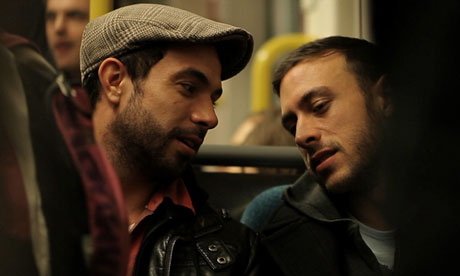Because the following review is so well written and accurate, I will forgo writing my own review. Instead, I want to add that I found the film to be a look into the heart of homosexual love. There is something unique and wonderful about two men loving one another that is not the same as heterosexual love. This film reveals what that is in a way that is authentic and moving. Both kinds of love have their own beauty and truth, but there is a fascinating difference we are often too ready to overlook or deny. Weekend gives us a more profound understanding.
Weekend – review
A lo-fi, tremendously convincing account of contemporary gay life

Something urgent to say about the windows of opportunity in our lives … Weekend
"Weekends, like life, are short." That melancholy reflection from Kind Hearts and Coronets does justice to some of Andrew Haigh's unassumingly excellent lo-fi feature: a boy-meets-boy love story extending over a single weekend, and filmed with a kind of real-time realism. There is sadness here, as well as romance, and a sense that sexual experience is not merely exciting for its own sake, but an adventure in defining one's sense of self: what one character here calls finding both partner and your self as a blank slate. Weekend has something urgent to say to both gay and straight audiences about the windows of opportunity in our lives.
Russell is a gay guy in his 20s who seems happy enough. We see him first at a party being thrown by his straight friends, with kids. He leaves early – to his hosts' disappointment – claiming to be tired, but on his way home on the bus he stops off at a gay bar, and meets Glen, who works at the local art gallery. They go home together for what both assume will be a fleeting, pleasurable fling. But in the morning, their conversation continues, and they wonder if they might have a future together. But first, they have to make some decisions on the subject of monogamy and what they want from life in the first place, and they discover they have far less time to make these decisions than they thought.
Russell is gentle, thoughtful, introverted; Glen is bold, worldly and a little confrontational in his need to assert his gay identity. In these roles, Tom Cullen and Chris New give tremendously relaxed and utterly convincing performances, very well directed by Haigh. It is the kind of film-making that looks easy, but isn't. For a lot of the time, nothing much is actually happening. Glen and Russell are hanging out, or drinking, or doing drugs, or having sex, and all these activities have an unselfconscious reality to them.
A more traditionally conceived "issue" movie would have included a scene of gay-bashing, but Haigh takes what looks like a conscious decision to defuse this particular dramatic firework. Glen yells at some gay-baiters from Russell's 14th-floor window, and on a railway platform, and he gets into a row with a straight guy in a pub, but there is no violence. Haigh's concern is always to refocus our attention on to a lower-key, but in its way far more sensational, subject: how Glen and Russell are going to work out their problems and find love. It is a tender, humane film, with an easy, unforced cinematic language: a film that doesn't need to try too hard.
http://www.guardian.co.uk/film/2011/nov/03/weekend-film-review
Jack
Russell is gentle, thoughtful, introverted; Glen is bold, worldly and a little confrontational in his need to assert his gay identity. In these roles, Tom Cullen and Chris New give tremendously relaxed and utterly convincing performances, very well directed by Haigh. It is the kind of film-making that looks easy, but isn't. For a lot of the time, nothing much is actually happening. Glen and Russell are hanging out, or drinking, or doing drugs, or having sex, and all these activities have an unselfconscious reality to them.
A more traditionally conceived "issue" movie would have included a scene of gay-bashing, but Haigh takes what looks like a conscious decision to defuse this particular dramatic firework. Glen yells at some gay-baiters from Russell's 14th-floor window, and on a railway platform, and he gets into a row with a straight guy in a pub, but there is no violence. Haigh's concern is always to refocus our attention on to a lower-key, but in its way far more sensational, subject: how Glen and Russell are going to work out their problems and find love. It is a tender, humane film, with an easy, unforced cinematic language: a film that doesn't need to try too hard.
http://www.guardian.co.uk/film/2011/nov/03/weekend-film-review
Jack


No comments:
Post a Comment